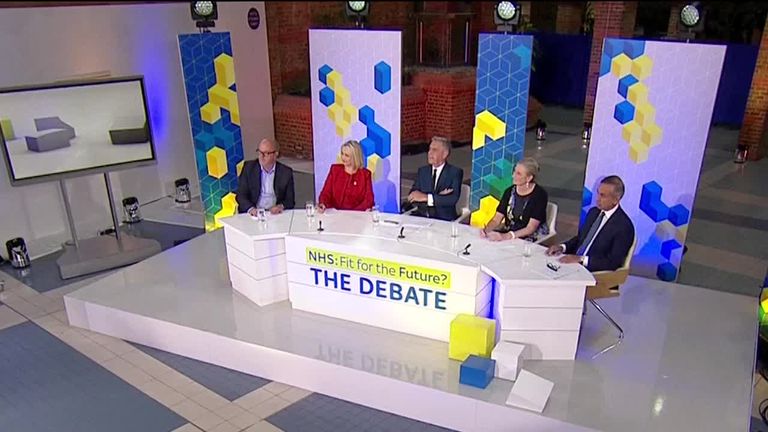Public ready for more nuanced debate on NHS
We've been looking at whether the NHS is fit for the future and at a live debate we examined how it should be funded and managed.
Thursday 5 July 2018 03:52, UK
One of the challenges of finding and answer to the NHS's ills is working out what the question is.
Sky News' coverage to mark the 70th anniversary of the service this week has been framed by a broad query: is it fit for the future?
At a live debate at Guy's Hospital in central London we tried to be more specific. In front of a politically balanced audience we weighed contrasting visions of how the NHS should be funded and managed.
The proposals followed politically predictable lines.
Sean Worth, a former advisor to David Cameron, championed the private sector. "We have a problem, and money alone won't solve it," he said.
Sonia Sodha, who did a similar job for Ed Miliband, supported the status quo.
"The combination of an ageing population, and younger generations who do not take prevention seriously, means the cost of healthcare can only rise," she said.
"As citizens we should take the medicine of higher taxes to preserve the free-at-the-point-of-use model."
These have been the dividing lines of political debate over the NHS since its foundation, amplified in the social media age by eight years of austerity, labour disputes, and the advent of Jeremy Corbyn's Labour Party.
Sentimentality and ideology shape much of the discussion and sometimes constructive discussion can be crowded out by voices from the extremes.
Among the judges of our expert panel however there was consensus.
A former chief executive of the NHS, the president of the Royal College of GPs, the chair of the parliamentary health and social care committee and a former Labour health minister agreed on much of the diagnosis.
The overwhelming challenge, they all said, is access.
Helen Stokes-Lampard of the RCGPs was blunt. "We are talking about a GP shortage in every practice in the country," she said.
Lord Darzi described the daily experience of walking into his hospital, St Mary's in London.
"I see it every day. We have staff shortages, we have huge queues in A&E, we have problems admitting patients for elective surgery."
But he was clear about progress the NHS has made. "Outcomes are much, much better today than they were when I was a minister," he said.
"The problem we have is one of access. Once you are seen, you will have a much better outcome than 10 years ago."
They agreed too that the current NHS structure, child of the Coalition reforms driven by Lord Lansley, are an impediment to effective management and care.
Equally, no-one has an appetite to change them, so some of the best brains in NHS management are devoted to working around them.
Sarah Wollaston MP, the most influential parliamentarian in healthcare outside the Cabinet, was emphatic. "What the NHS needs is a period of stability."
She was equally clear that she expects the bill to the public purse of the NHS and social care to rise, and Brexit does not provide the answer.
"I would be delighted if there is a Brexit dividend, but I don't think it is going to happen, and we need to level with people about how we are going to bring the money in."
That fundamental question will be answered in Downing Street, not by the combined wisdom of the NHS. The prime minster has promised more money, the Chancellor will try to find it.
Based on the response of our studio audience however he may have more latitude than entrenched positions allow.
Asked if the NHS should rely for more money wholly on increased taxes, or consider private alternatives, more than half voted for the latter.
The public may be ready for a more nuanced debate than we imagine.








